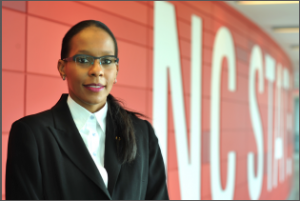Dr. C. Ellen Washington Presents at Gender Summit 5, Capetown, South Africa

C. Ellen Washington was invited to present at the Gender Summit 5 in Cape Town, South Africa on April 25-29, 2015. The Gender Summit platform was introduced to the continent by a partnership of regional research funders led by the Human Sciences Research Council (HSRC). Partners in South Africa included the Department of Science and Technology, the Department for Women and the National Research Council, as well as Howard University, USA.
The GS5-Africa was received with enthusiastic response from all the participants, who welcomed the idea of applying the gender lens to improve research and development outcomes and the idea that actions must be evidence-based and consensus-led. The event attracted energetic interest from South Africa’s media, with many speakers invited to take part in TV interviews and radio call-in programs.
Dr. Washington’s presentation focused on “Women of the African Diaspora in STEM Leadership.” Women of the African diaspora represent one of the fastest-growing and richest pools of untapped talent in the academic STEM disciplines in the United States. The urgent need for widening their rates of participation in STEM is fueled by projections that global labor markets will require greater expansions in science and engineering than in any other sector in the 21st century.
 There is also a need to cultivate the kind of talent in these fields that possesses an affinity for and cultural sensitivity to historically underserved communities. However, in U.S. institutions of higher education, women of color remain underrepresented in STEM. Recent evidence suggests that the retention of more women faculty and administrators of color would provide the kind of same-gender/same-race mentoring that could not only redress these trends, but also yield strong psychosocial support, better career outcomes for minority women students and global equity. To that end, the Entropic Career Identity Development (EnCID) model, which delineates pathways to academic STEM career actualization for women of color, provides a formative and multidisciplinary framework that holistically considers the intersectionality of multiple identities of women of color within institutional, social and political contexts.
There is also a need to cultivate the kind of talent in these fields that possesses an affinity for and cultural sensitivity to historically underserved communities. However, in U.S. institutions of higher education, women of color remain underrepresented in STEM. Recent evidence suggests that the retention of more women faculty and administrators of color would provide the kind of same-gender/same-race mentoring that could not only redress these trends, but also yield strong psychosocial support, better career outcomes for minority women students and global equity. To that end, the Entropic Career Identity Development (EnCID) model, which delineates pathways to academic STEM career actualization for women of color, provides a formative and multidisciplinary framework that holistically considers the intersectionality of multiple identities of women of color within institutional, social and political contexts.
While full integration for women of color can be achieved with conventional strategies and interventions, the rate of success is often outpaced by global technological advances, threats to economic stability and an ever-increasing need to develop and diversify a competitively trained workforce. Thus, the STEM Women of Color Conclave, grounded in the Entropic Career Identity Model, exists as the quintessential catalyst for fully integrating women of color in the STEM fields and achieving STEM career identity, specifically at the faculty level. Women faculty of color, for centuries, have significantly impacted the education of women students, particularly from underrepresented minority populations (Wenglinsky, 1996; Wolf Wendel1998; Mack, et al., 2011). However, the representation of women of color at these levels in the academy is far below that which is needed to adequately provide underrepresented minority graduate students with sufficient access to either psychosocial support (O’Neill, 2002) or preferred role models (Etkowitz, et al. 2002).
Therefore, despite the overwhelming empirical evidence that suggests that interventions are needed at the graduate school level, the Conclave, now in its fourth year, features a major national convening of women faculty of color from diverse STEM disciplines and professions, as well as nationally recognized leaders with noted scientific expertise related to the study of women of color. Its focus is to form the collective intelligence necessary for building a national network, harness a centralized body of knowledge and best practices related to women of color and holistically promote – through the phases of career identity – the personal and professional development of women of color in the academy.
Dr. C. Ellen Washington is the assistant director for leadership and scholar in residence in the NC State Women’s Center. For more information, please see the Women’s Center website.
- Categories:


